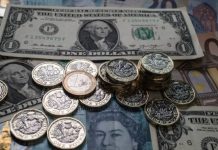
SINGAPORE: The dollar struggled for traction against its peers on Tuesday, with investors increasingly convinced the Federal Reserve will not raise interest rates this year amid risks of a sharper slowdown in global growth.
The greenback was marginally firmer against the yen, after falling 0.2 percent earlier in the session as traders wagered that the monetary tightening cycle in the world’s largest economy has been halted for the year.
On Friday, Fed Chairman Jerome Powell told the American Economic Association the Fed is not on a preset path of rate hikes and it will be sensitive to the downside risks markets are pricing in.
Powell’s colleague Raphael Bostic, the Atlanta Fed President, added to the central bank’s dovish tone on Monday. Bostic, who is not a voting member of the Federal Open Market Committee this year, said the Fed may only need to raise rates once in 2019.
The dollar index was marginally higher, fetching 95.80 at 0244 GMT. Earlier in the session, it had hit an intra-day low of 95.68.
The index has lost around 2 percent since mid-December and has followed a decline in U.S. bond yields as market participants have grown increasingly confident that the Fed will not hike rates in 2019.
The dollar had gained 4.3 percent in 2018 as the Fed hiked rates four times on the back of a strong domestic economy, falling unemployment and rising wage pressures.
But market expectations for further Fed tightening this year have shifted markedly in the last few months, with some traders now expecting even a rate cut this year.
Financial markets have been rattled by heightened worries about slowing global growth, especially in the United States and China, though data on Friday showed strong U.S. job growth.
Expectations of no further rate hikes this year are likely to keep the greenback under pressure.
The euro was down 0.2 percent at $1.1448, after touching an intra-day high of $1.1485. The single currency has gained around 1.3 percent over the last three trading sessions as the outlook towards the greenback weakened.
The euro’s recent strength has surprised some analysts as growth and inflation remain weak in the eurozone, well below European Central Bank forecasts.
The British pound changed hands at $1.2787, relatively unchanged from its previous close. Traders expect sterling to remain volatile over the next few weeks due to Brexit woes.
Britain’s Prime Minister Theresa May must win a vote in parliament to get her Brexit deal approved or risk seeing Britain’s exit from the European Union descend into chaos. The vote is now due to take place the week beginning Jan. 14.
May’s chances of winning the vote look slim as the DUP, the small Northern Irish party that usually props up her government, is opposed to the deal.
Elsewhere, the Australian dollar was lower by 0.15 percent at $0.7136. Despite its weakness on Tuesday, traders remain positive on the Aussie dollar over the short term.
Sentiment has been buoyed by aggressive stimulus measures in China, Australia’s largest importer of commodities, and also improved prospects for a U.S.-China trade deal.
U.S. Commerce Secretary Wilbur Ross predicted on Monday that Beijing and Washington could reach a trade deal that “we could live with”.






















